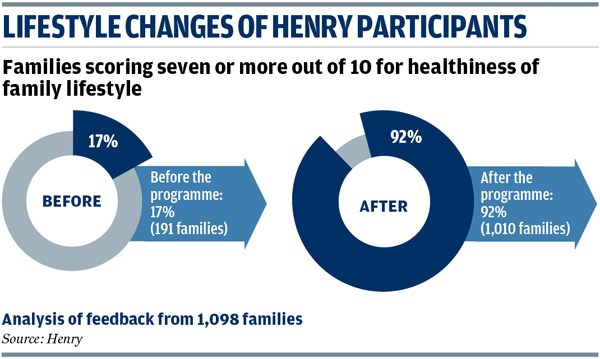How children and parents embrace a healthy lifestyle thanks to Henry
Emily Rogers
Tuesday, March 3, 2015
Project aims to ensure young children get a healthy start in life.

Project
Healthy Families: Right from the Start with Henry (Health Exercise Nutrition for the Really Young)
Funding
£2,000 annual licence fee for a council to run the programme. Initial training for practitioners costs £5,195 for 16 participants and is followed by a two-day course in facilitating the programme, costing £5,360 for 12 practitioners. Parent resource packs cost £20 each.
Background
Nearly one in four - 22.5 per cent - of children are overweight or obese when they start primary school, according to the Health and Social Care Information Centre.
In 2007, Mary Rudolf, professor in child health at the University of Leeds, teamed up with parenting and behaviour change expert Candida Hunt to develop a programme to tackle this issue, with funding from the Department of Health (DH) and the then Department for Children, Schools and Families.
In her 2009 DH-commissioned "framework for action" Tackling Obesity Through the Healthy Child Programme, Rudolf emphasised the most effective strategy was to work with parents to help them develop healthy family lifestyles and this principle formed the basis of the Henry programmes developed by Rudolf and Hunt and delivered since 2007. Henry became a charity in 2010 when government funding ended.
Action
Healthy Families: Right From the Start with Henry is an eight-week programme usually delivered in children's centres. Families can be referred by professionals such as health visitors or children's centre staff, or refer themselves.
The programme focuses on a healthy start for babies and small children, rather than on weight reduction. It covers five areas: parental skills and confidence; eating patterns and behaviour; healthy eating; physical activity and emotional wellbeing.
There are between eight and 10 participating families and each session starts with half an hour of family time, which involves adults and children enjoying a healthy snack together and an active game. Then the children go into the creche, enabling the adults to participate in the two-hour parent group. Parents reflect on the changes they have made in the previous week before embarking on group activities to explore that week's theme. Sessions are wrapped up by setting goals for the following week.
The sessions include information about healthy eating and physical activity, but a key aim is bolstering parental "self-efficacy". Parents are encouraged to develop an authoritative parenting style by setting and sticking to boundaries and modelling healthy lifestyles. Another key aim is to boost the emotional wellbeing of the whole family, which helps them make healthier choices, according to Henry chief executive Kim Roberts. Participants are helped to develop "responsive parenting" through empathy and listening skills.
Resources include a DVD, books and food charts featuring portion sizes, as well as active play ideas. A targeted one-to-one version of the programme is also available for families with babies and small children at risk of obesity.
The programme is being delivered in 30 areas to around 1,500 families a year.
Outcome
Families who took part in the programme were asked to rate themselves out of 10 for the healthiness of their lifestyle. Of 1,098 families who took part in the programme between January 2012 and January 2015, just 17 per cent awarded themselves seven or above before they started. But that soared to 92 per cent after the programme.
Of 1,067 families participating in courses in the same period, 23 per cent said their children ate fruit and vegetables five times a day before Henry, which nearly doubled to 45 per cent after the programme.
These internal findings follow an independent 2013 evaluation led by Dr Thomas Willis at the University of Leeds and published in the journal Pediatric Obesity. Analysis of questionnaire responses from 60 participating families showed the programme increased adults' confidence in their parenting as well as improving families' eating habits.
If you think your project is worthy of inclusion, email supporting data to derren.hayes@markallengroup.com





